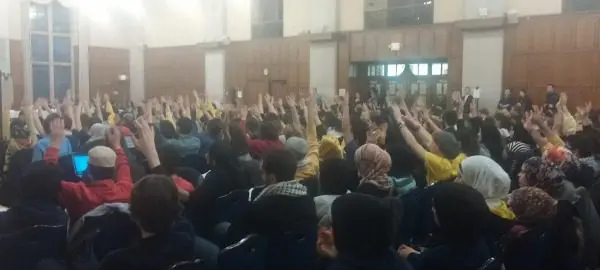
|
| Students raising their hands as a gesture for applause during the CSG meeting, March 31 |
ANN ARBOR — The University of Michigan student government voted against a resolution to set up a committee to investigate the human rights record of four companies that do business with the Israeli military, after hours of debate in which more than 20 speakers argued for and against the proposal.
At the end of a 5-hour meeting that continued into the early hours of Wednesday, April 1, the Central Student Government (CSG) struck down the resolution, which was proposed Students Allied for Freedom and Equality (SAFE), with 29 voted against, 15 in favor and one abstention.
The proposal targeted four companies, The Boeing Company, Caterpillar Inc., G4S and the United Technologies Corporation.
U of M sophomore Danielle Rabie, who supported the resolution, said she was disappointed but not surprised in the outcome of the vote.
“The university has had a tense relationship with minority students, particularly Palestinians,” Rabie said.
Last year, SAFE attempted to pass a similar resolution and sparked a debate on campus that garnered national attention. Last March, CSG decided to indefinitely postpone the resolution, which prompted the students who support it to stage a sit-in at the student government’s chambers and rename it the Edward Said Lounge. The following week, the student government brought up the resolution for voting again and struck it down.
Rabei said it was a positive that CSG did not attempt to silence Palestinian students like last year.
On Tuesday evening, SAFE brought Ali Abunimah, the co-founder of the Electronic Intifada, to make the case for the resolution.
The Palestinian American journalist highlighted the failure of the U.S. sponsored peace talks, urging the student government to act on the issue of Palestinian rights.
“Just a few weeks ago, the Israeli Prime Minister Benjamin Netanyahu was re-elected after publicly repudiating the two-state solution and saying he would never allow a Palestinian state on his watch,” he said.
Abunaimah quoted a Guardian article stating that more Palestinians have been killed in 2014 by Israel than any other year since 1967.
He added that the student government should not wait for everybody to agree in order to defend human rights.
“We heard the argument divestment is divisive,” he said. “But, who looks back now and says divestment in South Africa was a mistake?”
Opponents of the resolution introduced U of M history professor Dr. Victor Lieberman to criticize it.
Lieberman, who was spoke at a CSG meeting last year to present an impartial narrative of the Israeli-Palestinian conflict, said Palestinians are responsible for their own conditions.
“Israel has offered to recognize Arab sovereignty on five occasions,” Lieberman said.
He added that if Palestinians had taken the Israeli offers, there would have been no refugees, settlements or occupation.
The history professor enumerated human rights violations and civilian casualties in Syria, Russia, Turkey, China, India and Sir Lanka to demonstrate that the resolution unfairly singles out Israel.
CSG rules require the audience to remain silent. Students in attendance raised their hands and moved their fingers as a gesture for applause but occasionally erupted in cheers to the dismay of CSG representatives.
The Rogel Ballroom, where the meeting took place, was somewhat segregated between opponents of the resolution, who mostly sat to the right of the podium and supporters, who mostly sat on the left side.
This year witnessed a heavier presence for the resolution’s critics than last year, when a significant majority of the audience was in support of divestment.
Before the vote, CSG President Bobby Dishell said he would veto the resolution if it passes. Dishell stressed that the proposal does not meet the university’s standards for divestment, especially the consensus requirement.
He said the SAFE proposal is an assault on the Jewish state.
“As a Jewish American, behind the political rhetoric, this resolution is a direct attack on my people,” he said. “I am proud to be an American, a Jew and a Zionist, and I oppose this resolution.”
The argument about consensus became a focal point of the debate, with those who oppose the resolution saying that lack of consensus is clear as evident by the divide in the room and supporters arguing that there is an overwhelming consensus for preserving human rights in general.
The authors of the resolution explained that the proposal does not ask the student government to divest from the companies at hand but rather demands that CSG support forming a committee to investigate the university’s investment in those companies.
CSG representative Michael Chrzan slammed the student government’s vote for not allowing minority students “to have their voices acknowledged by the administration.”
Chrzan added that the university should reexamine its role as a public institution if its minority students are silenced.
“What I saw tonight was a clear exercise in privilege,” Chrzan wrote on Facebook after the meeting. “I saw a group of students from a specific ethnic background that is underrepresented at this university and their allies present a cohesive and sound argument to investigate where our public institution spends public and student money. I saw that argument turned away not because of sound rebuts but because of nothing more than privilege.”
Journalist Max Blumenthal, who was the guest speaker in favor of the resolution last year, criticized CSG’s decision.
“U of Michigan CSG votes down #UMDivest, meaning resolution can’t go to Board of Regents. They essentially voted to suppress further debate,” he wrote on Twitter.
The hashtag #UMDivest has been trending on twitter last week since the resolution was introduced.
After the vote, supporters of divestment took to social media vowing to push a similar resolution again next year.
“We’ll be back next year & every year after that to hold @umich accountable of its investments. Much love to all our supporters. #UMDivest,” tweeted SAFE’s official account.






Leave a Reply